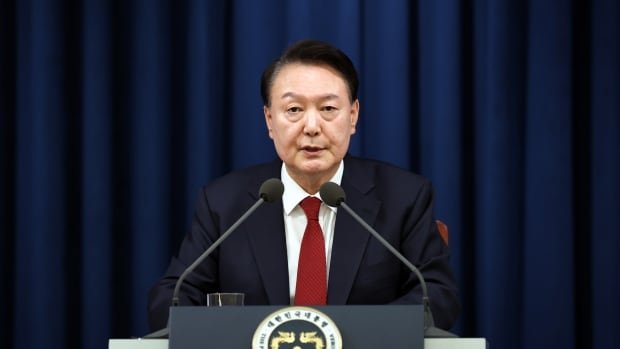Physical Address
304 North Cardinal St.
Dorchester Center, MA 02124
Physical Address
304 North Cardinal St.
Dorchester Center, MA 02124

South Korea’s opposition parties on Wednesday filed an impeachment motion against President Yoon Suk-yeol, who faces pressure to leave office hours after he ended a brief martial law that forced soldiers to surround parliament before lawmakers voted to lift it.
In order for June to be impeached, this motion would need the support of two-thirds of the parliament and then the support of at least six judges of the Constitutional Court. The motion, jointly submitted by the main opposition Democratic Party and five smaller opposition parties, could be voted on as early as Friday.
Jonah’s senior policy advisers and Defense Minister Kim Yong-hyun offered to resign as the nation struggled to understand what appeared to be an ill-conceived stunt.
Tourists and residents were walking around the capital, traffic and construction could be heard, and apart from the throngs of police officers holding shields in their hands, it seemed like an ordinary sunny, cold December morning.
On Tuesday night, Yon abruptly imposed martial law, vowing to eliminate “anti-state” forces after struggling to push his agenda through the opposition-dominated parliament. But his martial law was only in effect for about six hours as the National Assembly voted to remove the president. The declaration was officially lifted around 4:30 a.m. during a Cabinet meeting.

The liberal opposition Democratic Party, which has a majority in the 300-member parliament, said on Wednesday that its lawmakers had decided to call on Jonah to step down immediately or face steps to impeach him.
“President Yoon Suk Yeol’s declaration of martial law was a blatant violation of the constitution. It did not meet any requirements to declare it,” the Democratic Party said in a statement. “His declaration of martial law was null and void in the first place and a serious violation of the constitution. It was a serious act of rebellion and provides an excellent basis for his impeachment.”
His impeachment would require the support of two-thirds of parliament, or 200 of its 300 members. The Democratic Party and other small opposition parties have a total of 192 seats. But when parliament voted 190-0 to reject Jonah’s martial law declaration, 18 lawmakers from Jonah’s ruling People’s Power Party voted in favor of the rejection, according to National Assembly officials.
People’s Power Party leader Han Donghun, who has long-standing ties to Yona as far back as a prosecutor, criticized Yona’s martial law declaration as “unconstitutional.”
A request to the members of the Cabinet of Ministers
If Yoon is impeached, he will be stripped of his constitutional powers until the Constitutional Court decides his fate. Prime Minister Han Daks-soo, South Korea’s second-in-command, will take over as president. Amid calls for Yoon’s cabinet to resign, Han issued a public message asking for patience and urging cabinet members to “fulfill their duties even after this moment.”

At least six of the nine judges of the Constitutional Court must support the proposal submitted by the legislators to remove June from office. But the court currently has just six justices after three were fired, one short of the seven needed to hear a presidential impeachment case, prompting lawmakers to speed up the process of appointing new justices.
Yoon’s martial law declaration, the first of its kind in more than 40 years, echoed South Korea’s past military-backed governments, when authorities occasionally declared martial law and other decrees that allowed them to deploy combat troops, tanks and armored vehicles on streets or in public places , for example in schools to prevent anti-government demonstrations. Such scenes of military intervention had not been seen since South Korea achieved true democracy in the late 1980s and until Tuesday night.
Soldiers carrying full combat gear, including assault rifles, tried to keep protesters away from the National Assembly as military helicopters flew overhead and landed nearby, according to Yon’s statement. One soldier pointed his assault rifle at a woman who was among the protesters outside the building demanding the lifting of martial law.

It was not clear how 190 lawmakers could enter the parliament hall to reject Yoon’s martial law decree. Opposition leader Lee Jae-myung live-streamed himself climbing over the wall, and while troops and police blocked some from entering, they did not aggressively restrain or use force against others.
No major violence has been reported. Troops and police personnel were later seen leaving the grounds of the National Assembly after parliament voted to lift martial law.
National Assembly Speaker Woo Won Shik said: “Even with our unhappy memories of military coups, our citizens have certainly observed modern events and seen the maturity of our military.”
Concerns are growing in BC’s Korean community after South Korea’s president imposed martial law overnight. The law has since been repealed following a political backlash and widespread protests in the country. As John Hernandez reports, many hope a quick resolution is a sign of the country’s democratic government.
According to South Korea’s constitution, the president can declare martial law “under conditions of war, war-like situations or other comparable national emergencies” that require the use of military force to restrict freedom of the press, assembly and other rights to maintain order. Many observers question whether South Korea is currently in such a position.
The constitution also states that the president must take responsibility if the National Assembly, by a majority vote, requests the lifting of martial law.